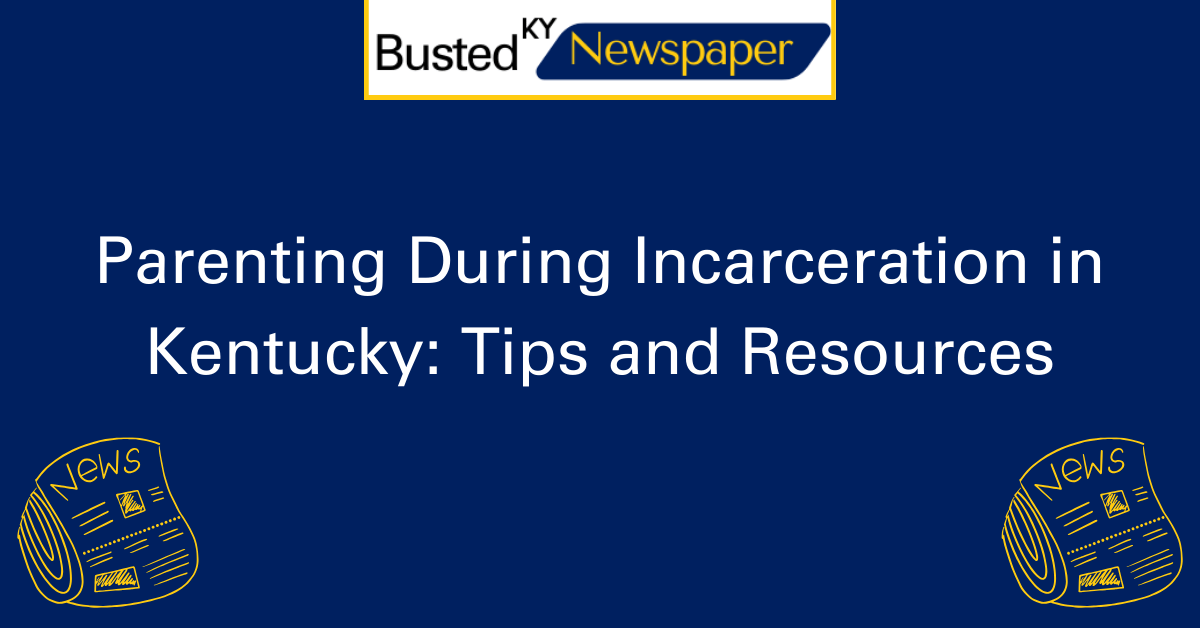Parenting During Incarceration in Kentucky: Tips and Resources
Parenting during incarceration can be a challenging and complex journey, filled with unique obstacles and uncertainties. It is a topic that requires understanding and support, as families navigate the complexities of maintaining relationships and providing care in the face of separation.
In Kentucky, there are various resources and tips available to assist parents who are incarcerated in their efforts to stay connected with their children and provide the necessary support. These resources aim to empower incarcerated parents and equip them with the tools and knowledge they need to foster healthy relationships with their children, even in difficult circumstances.
Resources for Communication
Effective communication is essential for maintaining relationships between incarcerated parents and their children. In Kentucky, there are several resources available to facilitate this connection. One such resource is the Parent-Child Visitation Program, which allows supervised visits between incarcerated parents and their children. These visits provide an opportunity for face-to-face interaction and can help strengthen the bond between parent and child.
Additionally, the Department of Corrections offers video visitation services, allowing parents to communicate with their children through video calls. This technology enables more frequent and convenient communication, reducing the barriers imposed by physical separation.
Support for Emotional Well-being
Parenting during incarceration can be emotionally challenging for both parents and children. Kentucky recognizes the importance of supporting the emotional well-being of incarcerated parents and their children. The Department of Corrections provides access to counseling services, both for parents and children, to address the emotional impact of separation and offer guidance on coping strategies.
Furthermore, support groups are available for incarcerated parents, where they can connect with others facing similar challenges. These groups provide a safe and understanding environment for sharing experiences, seeking advice, and finding emotional support.
Parenting Education Programs
Incarcerated parents must have the knowledge and skills necessary to provide effective parenting, even while separated from their children. Kentucky offers various parenting education programs within correctional facilities. These programs cover topics such as child development, discipline strategies, and communication techniques.
By participating in these programs, incarcerated parents can enhance their parenting skills and gain a better understanding of their children’s needs. This knowledge equips them to continue playing an active and positive role in their children’s lives, despite the challenges they face.
Reuniting Families After Incarceration
Reintegration into family life after incarceration can be a complex process. Kentucky recognizes the importance of facilitating this transition and offers support services to help incarcerated parents reunite with their children. These services include family counseling, case management, and assistance with housing and employment.
By addressing the practical and emotional aspects of reuniting families, Kentucky aims to promote successful reunification and ensure the well-being of both parents and children.
Building Resilience and Empowering Families
Parenting during incarceration requires resilience and empowerment. Kentucky is committed to supporting incarcerated parents in building these qualities through various programs and initiatives. These initiatives focus on personal growth, skill development, and fostering a sense of self-worth.
By empowering incarcerated parents, Kentucky aims to strengthen their ability to maintain meaningful relationships with their children and navigate the challenges of parenting during and after incarceration.
FAQ’s
Parenting during incarceration can be a challenging and complex journey, filled with unique obstacles and uncertainties. Separation from their children is one of the biggest challenges faced by incarcerated parents. They often struggle with limited communication options, lack of physical presence, and difficulties in providing emotional and financial support.
In Kentucky, there are various resources and tips available to assist parents who are incarcerated in their efforts to stay connected with their children and provide the necessary support. These resources include visitation programs, phone calls, video calls, and mail correspondence. Incarcerated parents can also participate in parenting classes and workshops to enhance their parenting skills.
Kentucky offers several support programs for incarcerated parents. These programs focus on parenting skills, emotional support, and reintegration into society after release. They provide counseling, mentorship, and educational opportunities to help incarcerated parents maintain healthy relationships with their children and successfully transition back into their roles as parents.
Despite the challenges, incarcerated parents can still provide care for their children from prison. They can actively participate in decision-making regarding their children’s education, healthcare, and overall well-being. By staying connected through regular communication, offering emotional support, and maintaining a positive attitude, incarcerated parents can play an active role in their children’s lives.
Yes, Kentucky offers resources and support for incarcerated parents after their release. These include reentry programs that assist with housing, employment, and accessing community services. By providing a smooth transition and ongoing support, these programs aim to help formerly incarcerated parents reintegrate into society and rebuild their relationships with their children.







